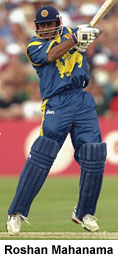Finding the behavioural balance
Daniel Laidlaw
The issue of on-field player conduct has been raised again recently with
the suspension of Indian captain Sourav Ganguly and the comments made by
former Sri Lankan batsman Roshan Mahanama in an interview published on rediff.com.
There are two main points to take from these events: Firstly, if sledging
is occurring it should be treated with the same severity as dissent and secondly, to differentiate between sledging and "testing the mental ability of a batsman."
I refer to this paragraph from the Mahanama interview:
"I have always said the contest must stick to bat and ball. These people
shouldn't test the mental ability of a player to rattle and disrupt and
try to get him out. The Australians are good enough to beat any side in the
world without testing the mental ability of their opponents."
Now, Mahanama was a specialist batsman, so suffice to say he is not
looking at the game from a bowler's perspective. Nevertheless, it is still an
absurd comment that contradicts the nature of the game.
 Mahanama played an integral part in Sri Lanka's world record Test score of
952/6. He jointly holds the record for Test cricket's highest ever
partnership so perhaps he enjoyed that domination of the bowling to such
an extent that his judgement of the contest between batsman and bowler has
been permanently clouded. Mahanama apparently fails to understand that the
primary reason for the existence of bowlers is to get batsmen out.
Moreover, they are required to do that with enough skill, planning and deception to
put doubt in the batsman's mind. In other words, to test the mental
ability of the batsman.
Mahanama played an integral part in Sri Lanka's world record Test score of
952/6. He jointly holds the record for Test cricket's highest ever
partnership so perhaps he enjoyed that domination of the bowling to such
an extent that his judgement of the contest between batsman and bowler has
been permanently clouded. Mahanama apparently fails to understand that the
primary reason for the existence of bowlers is to get batsmen out.
Moreover, they are required to do that with enough skill, planning and deception to
put doubt in the batsman's mind. In other words, to test the mental
ability of the batsman.
At the elite level, with players often possessing approximately the same
level of talent, the difference between winning and losing can be made by
who is stronger of mind and able to get the most out of his ability. To
remove that element is to reduce the essence of the sport.
Does Mahanama think, for example, that after receiving a bouncer, the
bowler is then required to bowl another bouncer because it is wrong to test the
thinking, the mental ability, of the batsman by following it up with a
yorker? Perhaps it is merely the view of someone who thinks the raison
d'etre of bowlers is to serve the ball up for batsmen to hit.
Is cricket, and sport, only about strength, stamina and physical
challenge?
It would be dreadfully dull if it were.
Spinners attempt to deceive batsman through flight, variation and degree
of spin. Are they not testing the mental ability of the batsmen to correctly
determine and adjust to what type of ball they are receiving?
In order to capture a wicket, fast bowlers are often required to make the
ball move off the pitch in a way that makes batsmen question what type of
shots they should play to particular deliveries. Forcing the batsman to
question himself and the type of ball he is about to receive is at least
half the battle. It is purely mental.
Similarly, captains require more mental ability than anyone else. They
have to decide how to react tactically to the contest being played out before
them. How much pressure they are able to withstand when the game is
against them can determine their standing as a captain. If they weren't tested, we
would never know.
The list of examples can go on ad nauseam. International cricket is almost
entirely a test of mental ability. In fact, physical and mental ability
are inextricably linked.
No team is good enough to succeed without testing the mental ability of
their opponents. The contentious point is actually how they do it -
whether it is with action or with words. To be fair to Mahanama, this is where he
has a point. The problem is that he fails to differentiate between
sledging - abusive language directed at an opponent - and the testing of mental
ability. Surely you can test someone's mental ability without abusing him.
 Real sledging obviously has no place in cricket. Anything less than that,
though, just adds to the drama and enjoyment the contest, at least from a
spectator's perspective. It is entertaining to watch an aggrieved bowler
verbally challenge a batsman and to see the batsman respond by becoming
even more determined. Clearly, many feel that this is still unacceptable, but
it is undeniable that such contests produce enthralling theatre. The
difficulty lies in establishing boundaries.
Real sledging obviously has no place in cricket. Anything less than that,
though, just adds to the drama and enjoyment the contest, at least from a
spectator's perspective. It is entertaining to watch an aggrieved bowler
verbally challenge a batsman and to see the batsman respond by becoming
even more determined. Clearly, many feel that this is still unacceptable, but
it is undeniable that such contests produce enthralling theatre. The
difficulty lies in establishing boundaries.
Cricket is an intensely confrontational game with a tradition of peaceful
values, a contradiction that continues to vex observers and which our
game's divergent cultures grapple with. We are continually trying to reconcile a
war-like sport with gentlemanly ideals and cherished axioms like "it's not
cricket". The intentions to preserve these values are honourable but not
really relevant to today's sporting environment. However, whether you use
those romantic guidelines or tough laws to preserve the spirit of the
game, they're all equally meaningless unless breaches are fairly and uniformly
punished.
I cannot recall a single sledging-related suspension, which means one of
three things. Either no serious sledging occurs in international cricket,
the umpires are not aware of it, or the umpires are aware of it but are
neglecting to report it. The last possibility seems the most likely.
Umpires can get away with this because sledging is often far less graphic
than dissent. But if behaviour standards are to be strictly enforced then
they have to include all forms of on-field conduct and not just dissent.
We cannot have Ganguly being suspended for a trivial incident while potential
cases of racial abuse are ignored just because they are not public.
There is little doubt that current standards of behaviour often fall below
what everyone considers acceptable. But as long as penalties for
misconduct remain ambiguous and the judgement of match referees subjective there is
minimal hope of this changing. Ganguly was suspended for allegedly
disputing the umpire's decision; Ridley Jacobs similarly banned for not disputing
it. The sooner players and public are told specifically how they can and cannot
react, the better.
Surely the game can be played in the necessary spirit without ever losing
the element of human conflict that makes it so compelling.
More Columns
Mail Daniel Laidlaw